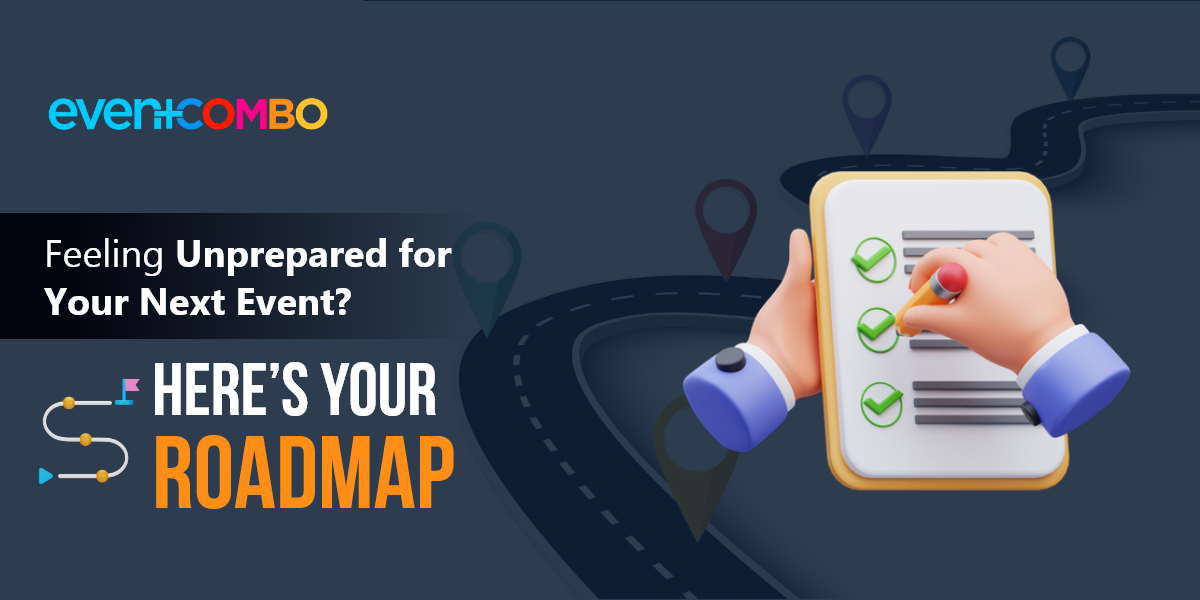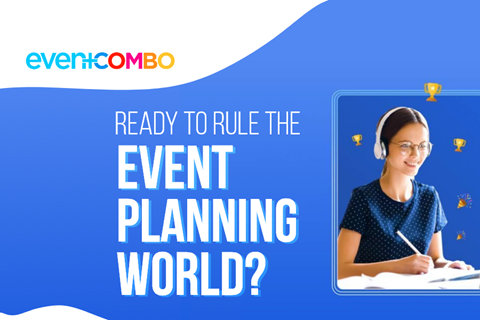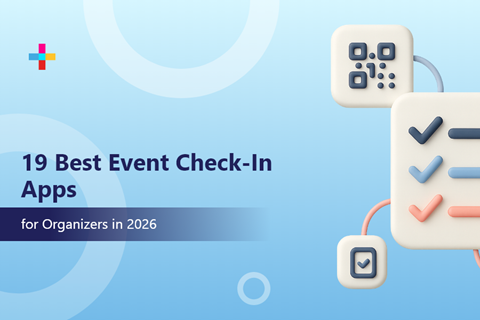

Planning a corporate event, whether it's in-person, virtual, or a blend of both, is no easy feat. We're not going to sugarcoat it and pretend it's a walk in the park. There's a ton of tasks to tackle, and the sheer scope of it all might make you wonder if event planners have some sort of superpower.
But here's the real deal: they don't. What they have is a meticulously crafted playbook, a corporate event planning checklist, that guides them through every step of the process. This checklist covers everything from selecting the perfect venue, managing your budget, setting the date and time, defining your target audience, securing sponsors, handling registrations, to crafting a killer marketing strategy. Every event is unique, and this checklist is flexible enough to adapt to the specific needs of your occasion.
Following this checklist isn't just about staying organized—it's about maximizing your efficiency, minimizing stress, and ensuring that you're making steady progress as the big day approaches. Think of it as your roadmap to success in the world of corporate events.
In this blog, we're going to share the ultimate checklist that you can easily tailor to fit your event like a glove.
Corporate Event Checklist: 6 – 12 Months Before the Event
Six months to a year before the event, you must work on the basics. This is the time to lay a strong foundation for the event by determining key aspects including:
1. Event Goals
Let's begin by addressing the fundamental question: why are you planning this corporate event? Identifying the purpose is essential as it sets the tone for the entire planning process. Are you aiming to bolster brand recognition, foster customer loyalty, or strengthen connections with stakeholders? Perhaps your goal is to expand your reach within your target demographic. It might involve informing attendees about your products or services, facilitating networking opportunities, generating leads, or showcasing a recent offering. Once you've pinpointed your objectives, event planning becomes easier. Understanding these goals is key to defining the desired outcomes and measuring success.
2. Target Audience
Prioritize understanding your target audience early in the corporate event planning checklist. Begin by aligning the event's purpose with the characteristics of the companies or individuals likely to be interested. Depending on your event's objectives, your target audience could range from prospective clients in the pipeline to established high-value accounts. Leveraging your existing networks can help identify the most relevant attendees. Maintaining a comprehensive guest database is crucial for effective outreach.
3. Event Date
Selecting the perfect date and time for your event is crucial. Aim for a date that doesn't conflict with similar events and avoids major holidays or public gatherings. Consider scheduling your event on dates of significance to your target audience, such as international celebration days or awareness months, to maximize exposure and marketing opportunities.
4. Event Venue
Carefully evaluate potential venues to ensure they align with your event's theme and objectives. Here are some checklist points to tick off:
5. Event Budget
A comprehensive corporate event checklist must include budget estimation to guide financial planning. Factor in essential expenses such as catering, equipment rental, speaker fees, staff travel, insurance, promotional activities, and event technology. Don't overlook costs associated with influencer collaborations and online advertising campaigns, as these can significantly impact your overall budget.
6. Core Event Planning Team
Identify key team members who will collaborate to bring your event to life. Decide whether to rely on your in-house team or engage an external event planning agency based on the complexity of your event and resource availability. In-house team members should possess qualities like intuition, flexibility, and leadership skills, while external agencies offer expertise and support for handling any last-minute challenges effectively.
7. Event Ticket Pricing
When determining the pricing for your event tickets, it's essential to factor in several key considerations. First, assess the perceived value of attending the event from the perspective of your attendees. What benefits do you believe they will derive from participating? Next, establish the actual price point that attendees are willing to pay, taking into account market standards and competitor pricing. Finally, calculate the cost per ticket, incorporating all expenses like staff salaries, marketing efforts, and production costs.
8. Event Branding
Craft a comprehensive event brief and branding strategy to ensure consistency and coherence in your messaging. Key branding elements to focus on include your logo, slogan, color palette, brand narrative, and tone of voice. Develop a dedicated event website and optimize it for search engines to enhance visibility. Additionally, plan out your digital content strategy for effective promotions across various online channels.
9. Event Technology Required
Investing in robust event technology is essential for seamless corporate event planning as they streamline tasks such as promotion, registration, and ticketing, while also enhancing attendee engagement. Opt for an all-in-one event management platform that offers multiple tools and features to optimize efficiency:
Event Planning Checklist: 4 to 5 Months Before the Event
This is the time to begin working on the planning process in earnest. Your major tasks 5 months before the event include:
10. Research and Pitch to Sponsors
Begin your sponsor and exhibitor outreach four to six months prior to your event. Identify potential partners who stand to benefit from participating, and craft compelling pitches that demonstrate the value of sponsoring your event. If your event includes exhibitors, consider creating an exhibitor manual to provide guidance and ensure a smooth experience for them.
11. Organize Site Visits to the Venue
Arrange visits to potential event venues multiple times to familiarize yourself with the facilities. Prepare a list of questions covering technical capabilities, pricing, catering options, and additional services. Reassess security measures, AV equipment availability, and accessibility considerations during these visits.
12. Create Invites
Craft invitations tailored to your target audience, clearly stating event details such as date, time, location, and purpose. Utilize your event management platform to distribute invites efficiently to all attendees.
13. Finalize Speakers and Special Guests
Four to five months before the event you should be able to finalize your speakers, presenters, or performers. Evaluate their qualifications, experience, and presentation style before initiating discussions. Discuss content, and style, and negotiate fees. Be mindful of your event budget while negotiating different expenses like travel, accommodation, etc.
14. Create Registration Systems
Determine registration fees and enable online registration and ticketing systems. Simplify the process by using event registration software that also facilitates event marketing. Use the solution to create custom registration forms and schedule delivery of branded emails to attendees. Configure the kind of tickets you need to sell. You can also offer discounts through coupon code or create hidden ticket types that can only be accessed by entering a code.
15. Seal the Deal with Your Suppliers and Vendors
Solidify agreements and fees with suppliers and vendors well in advance. Clearly communicate your expectations and deadlines to ensure smooth execution. Obtain contracts and confirm bookings promptly to avoid unnecessary delays.
16. Brainstorm Event Activities
Research and select activities aligned with your event goals and expected attendance. Steer clear of very complex activities that need too many steps or those that require a lot of equipment. Based on your goals, these can be problem-solving games, activities that promote networking or team building.
17. Start Logistical Planning
Start coordinating AV equipment, sound systems, Wi-Fi, lighting, and decorations for the venue. Review security arrangements with venue managers and secure necessary insurance policies. Arrange travel and accommodation as needed for staff and other stakeholders.
18. Follow Event Promotional Plan
Implement a comprehensive promotional plan, including content creation for your event website, social media platforms, and other marketing channels. Generate excitement through promotional videos, blogs, newsletters, and press releases highlighting speakers and performers.
19. Create Event Materials
Develop event collateral such as agendas, presenter handouts, name badges, signage, and promotional items. Arrange for translation and printing as necessary to ensure a seamless event experience for attendees.
20. Review Contingency Plan
Even though your event planning covers all bases, unforeseen circumstances may arise. Review your contingency plan or fallback procedure if something goes awry in the event. Train your team to address all kinds of challenges effectively.
Corporate Event Planning Checklist: 2 to 3 Months Before the Event
The clock is ticking, and you may feel excited and nervous simultaneously. Two to three months prior to the big day, it's time to open registrations, contact speakers, update menus, and take a deep look into whether the following tasks have been completed.
21. Initiate Registration and Ticket Sales
Launch registration and ticket sales, and set reminders for deadlines. Continuously promote event registration through email campaigns and social media channels. Foster networking opportunities leading up to the event.
22. Confirm Equipment Needs with Venue
Assess if additional audiovisual services such as photography, videography, DJ, and lighting are required, and hire relevant personnel accordingly. Review and finalize any additional agreements with the venue.
23. Develop Logistics Checklist
Compile a detailed checklist of all event items and assign responsibilities to team members. Specify the placement of each item within the venue.
24. Coordinate with Speakers
Ensure all speakers and performers are informed about their travel and accommodation arrangements. Maintain copies of their speeches and clarify their roles and responsibilities.
25. Reassess Food Menu
Accommodate new dietary requests, if any, by making necessary adjustments to the food and beverage offerings.
26. Finalize Event Collateral
Thoroughly review and proofread all event-related documents and printed materials, including signage, invitations, banners, business cards, speaker materials, and post-event branded materials.
27. Ramp Up Promotional Efforts
Intensify publicity and promotional campaigns two to three months before the corporate event. Adhere to the established promotional plan and assign individuals to develop additional promotional content, such as media kits, invitations, and posters.
28. Review Event Agenda with Core Team
Review the entire event agenda with your core team to ensure everyone is familiar with guest speakers, sessions, networking opportunities, workshops, breaks, and other planned activities.
Corporate Event Checklist: 1 Month Before the Event
You and your team should be fully aware of the event schedule by now. Assess if the following tasks have been completed and if not, determine the reasons, and get them done.
29. Approve Final Event Agenda
One month before the event you must reconfirm arrangements with venue, speakers, vendors, and other stakeholders to ensure everything is proceeding as planned. Further, review the flow of the event and attendee experience. Have the event itinerary ready and easily accessible for the core team.
30. Prepare the Speakers
Prepare a script or talking points for finalized speakers, or request them to provide their own, so you can ensure everything is ready. Make sure they know how long they need to speak and be on stage.
31. Answer Key Logistics Questions
One month before your corporate event you should have a clear answer to the following logistics questions:
32. Send Reminders to Attendees
Schedule emails to the final list of attendees and VIP guests. Also, check whether all media representatives know about their arrival time.
33. Evaluate Pre-Event Support
Assess whether you require onsite assistance for handling any event aspect. Evaluate whether your current team has sufficient support or if additional personnel are needed.
34. Print the Welcome Letter
You can compose a welcome letter containing event objectives and pertinent details for guests. Print the letters one month before the event.
35. Install Signage
Arrange for signage delivery and verify that branding elements, including logos, colors, and messaging, are accurately represented. Install signage in prominent locations at the venue.
36. Coordinate with Vendors
Confirm payment schedules with each vendor and ensure clarity regarding their roles and any requirements they may have for optimal event execution.
Event Planning Checklist: A Week Before the Event
A week before the event, you might feel like you've got everything planned out. However, there are still numerous things to take care of, including:
37. Revise the event schedule and script.
38. Send out the list of final attendees to your team.
39. Get hard copies of important documents related to your event and share them with your team as reference.
40. Arrange your goodies or giveaways.
41. Call the speakers and key people involved and ensure they know what is expected of them.
42. Send a final reminder to every attendee.
43. Reconfirm the schedule with your caterer.
44. Re-check your arrangements for onsite badging and smooth check-in.
Checklist for the Event Day
Congratulations! You have made it to the big day without exhausting yourself. Now, to ensure that the event goes successfully, keep checking the following things in your list.
45. Check the venue thoroughly. Inspect the furniture, hygiene of the place, equipment, signage placement, décor, mic, and restrooms.
46. Ensure you have dedicated teams ready to manage every aspect of your event.
47. Ensure event badges are printed smoothly on attendee arrival.
48. Ensure you have additional permits for VIPs.
49. Help sponsors and speakers wherever possible.
50. Confirm that the catering manager is aware of every detail.
51. Ensure that your suppliers are ready.
52. Communicate if you are keeping ticket sales open for the last minute.
53. Check whether your sponsors are welcomed appropriately.
54. Do a final check in terms of the security measures in the venue.
Post-Event Review and Evaluation Checklist
Now that you have successfully executed the event, it may feel like the time to relax and celebrate. Well, not quite. Post-event, it's essential to review all that happened so you can find insights to create even better experiences in the future. Here are the crucial things that should be part of your checklist.
55. Interact on Social Media
Post thank you notes, share about your events in a blog, and request attendees to post photos and tag your brand. Also, request your stakeholders to write about the experience.
56. Acknowledge Attendees, Speakers, and Staff
Recognize the contribution of your attendees, speakers, and staff. Show your appreciation by sending personal thank you notes.
57. Do a Post-event Survey
Evaluate what aspects were successful and what areas need improvement through a survey. Encourage attendees to participate in the survey to gather insights for enhancing future experiences. Design concise multiple-choice questions (MCQs) that attendees can quickly comprehend and answer. Utilize an Email Marketing Engine to efficiently distribute the survey to guests in bulk.
58. Do an ROI Evaluation
Calculate your total event spending. To measure your ROI, take into account the following attributes:
59. Organize a Post-event Meeting with Your Staff
Schedule a post-event meeting with your staff and discuss the successes and setbacks of the event. Determine if there are opportunities to enhance the event experience. Consider potential improvements in areas such as design, logistics, venue, or catering.
60. Leverage the Content Generated by the Event
If your event produced content that you believe can positively contribute to your business objectives, now is the opportune moment to leverage it. For instance, if your CEO delivered a compelling speech, include it in your post-event press release. Likewise, if you captured remarkable event footage, consider showcasing it through your social media handles.
61. Pre-Sell Your Next Event (If Applicable)
If you have an upcoming event already planned, pre-sell it along with your post-event promotions. You can leverage early bird discounts to prompt ticket sales.
We Know it’s a Lot, But We Are Here to Help!
The comprehensive month by month checklist will help you stay on track and achieve your event goals. It’ll work for different types of corporate events like trade shows, conferences, product launches, and networking events. Moreover, you can use it for your events repeatedly, modifying it with the improvements made after a previous event.
A robust event planning solution will help you immensely in easing different tasks. With Eventcombo’s suite of tools you can manage everything, from registrations, ticketing, invites, promotion, venue, sponsors, attendees, and more. Visualize how success looks like and track it post-event using performance metrics. Our event technology empowers you to focus on key priorities, ensuring each event delivers a remarkable experience. Reach out to us today to learn more. https://bit.ly/3R9bkuP

Professional certifications for event planners do more than provide a solid foundation in the field; they offer valuable exposure to the dynamic world of event planning and insights from prominent industry experts.

Choosing the right event management platform is vital for event professionals navigating the growing demand for in person , virtual, and hybrid events. Modern planners need solutions that offer robust features,...

Attendees don't notice good check-in. They only notice bad check-in. And planners know check-in is the first moment where their behind-the-scenes work gets exposed.